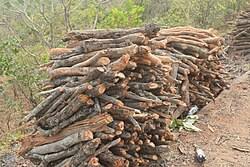In the arid landscapes of north-east Nigeria, firewood is more than just a household commodity — it is the backbone of survival for millions. Yet, what sustains daily life is also accelerating environmental degradation, exposing a stark paradox at the heart of the region’s fragile economy.
For countless families, particularly those displaced by the Boko Haram insurgency and ongoing insecurity, firewood remains the primary source of energy for cooking and heating. According to the International Organization for Migration (IOM), more than 2.2 million people are internally displaced across Borno, Adamawa, and Yobe states, many living in conditions where access to alternative energy sources is either unreliable or nonexistent. In these circumstances, the firewood trade has evolved into a critical livelihood option, sustaining thousands of households amid the widespread poverty and unemployment.
However, the human necessity of the firewood economy comes at a heavy ecological cost. Environmental experts warn that the unchecked felling of trees for firewood and charcoal production is depleting the region’s already sparse forest cover. The Food and Agriculture Organization (FAO) estimates that Nigeria loses about 400,000 hectares of forest annually, and the northeast — already grappling with desertification — is among the hardest hit. The environmental consequences include worsening soil erosion, reduced agricultural productivity, and increased vulnerability to climate change impacts, such as droughts and food insecurity.
The paradox lies in the fact that the very activity that enables economic survival is also undermining the environmental foundation necessary for long-term sustainability. As tree cover diminishes, communities are forced to travel farther to gather firewood, exposing women and girls — traditionally responsible for collecting fuel — to heightened risks of gender-based violence and abduction, particularly in conflict-affected zones.
Efforts to introduce alternative energy sources, such as clean cookstoves, solar-powered appliances, and biogas systems, have been made by humanitarian organizations and the government. Yet, adoption remains slow, hampered by cultural habits, high costs, and limited infrastructure. The Renewable Energy Master Plan launched by the Nigerian government aims to expand access to affordable and sustainable energy, but implementation in rural and conflict-affected areas lags far behind national targets.
Some local initiatives, like community tree-planting projects and the promotion of sustainable agroforestry practices, are beginning to gain ground. Still, experts argue that without stronger policy support, investment in renewable energy alternatives, and sustained community engagement, the firewood economy will continue to trap north-east Nigeria in a cycle of environmental decline and humanitarian vulnerability.
As the dry season looms and humanitarian needs rise, the firewood paradox in the northeast remains a stark reminder that survival today must not come at the cost of an unlivable tomorrow.







